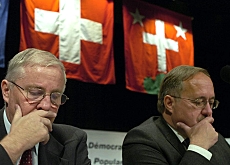
People’s Party reaffirms anti-Europe stance

The rightwing People's Party has put forward its latest position on the European Union, only favouring bilateral accords that protect Swiss sovereignty.
The new document, agreed upon at a national party conference, calls for the withdrawal of Switzerland’s dormant EU membership application.
At a meeting in Suhr in canton Aargau, party delegates unanimously approved the 11-point policy document, which states that the bilateral approach is only acceptable as long as Swiss sovereignty and democratic rights are protected.
Party members cleared the way for their representatives in parliament to prepare a referendum or people’s initiative if necessary to enforce this condition.
Switzerland applied to join the EU in May 1992. Brussels put the application on ice in the same year after the Swiss voted against joining the European Economic Area (EEA).
As an alternative to membership, Bern has taken the “bilateral” route, concluding 16 agreements with Brussels in two separate rounds of negotiations.
Party policy
The conference was an opportunity for the party to restate its opposition to Switzerland joining the EU, one of the cornerstones of party policy.
Various EU-related issues have aggrieved the People’s Party in recent months and years. One thorn in the side of the party is the SFr1 billion ($0.76 billion) that the state has committed to pay to EU cohesion funds to reduce social and economic inequalities.
The 345 attendees voted to roll back this offer and to block any new contribution to the EU.
On the subject of Switzerland’s application to join the EU, Swiss President and People’s Party representative Samuel Schmid said it was gathering dust “in a drawer” and didn’t count anymore.
“Whether it’s in Brussels or in Bern, a drawer is still a drawer,” he said.
Last month the cabinet indicated that EU membership was no longer a strategic objective of Switzerland, but a long-term option.
Independence
Justice Minister Christoph Blocher focused on Switzerland’s independence, and the freedom the country has to go its own way.
He said this room for manoeuvre had been under-utilised in recent years. His speech was greeted by a standing ovation.
“The desire to attach Switzerland to the EU has been too great in the administration and politics,” he added.
Party members also demanded that Switzerland should not systematically align its laws with European norms.
The country should also avoid focusing its economic policy on the “closed market of the EU”, and look instead towards other states and continents, delegates recommended.
Schmid emphasised that a new package of bilateral agreements, similar to those negotiated in the past, was not the way forward. Potential problems should be treated separately in future, he said.
swissinfo with agencies
In 1992 Switzerland applied for negotiations on EU membership, but the request was frozen in the wake of voters’ rejection of the European Economic Area treaty.
Switzerland and the EU have since concluded 16 bilateral accords.
On October 26, the government decided not to withdraw the request, but made full EU membership a long-term policy option, rather than a strategic aim.
The cabinet also agreed to the opening of an EU mission in Bern.

In compliance with the JTI standards
More: SWI swissinfo.ch certified by the Journalism Trust Initiative





























You can find an overview of ongoing debates with our journalists here . Please join us!
If you want to start a conversation about a topic raised in this article or want to report factual errors, email us at english@swissinfo.ch.